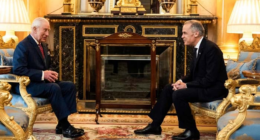In a significant diplomatic breakthrough, Russia and Ukraine have agreed to eliminate the use of force in the Black Sea following separate discussions with the United States in Saudi Arabia. The agreement, which aims to ensure safe navigation and prevent the use of commercial vessels for military purposes, was confirmed in White House readouts released on Tuesday.
Ukrainian President Volodymyr Zelenskyy described the accord as a “ceasefire” in the Black Sea during a press conference. Ukrainian Defense Minister Rustem Umerov emphasized that any movement by Russia of its military vessels beyond a designated area in the Black Sea would constitute a violation of the agreement. “In this case, Ukraine will have the full right to exercise self-defense,” Umerov stated in a Facebook post.
The agreement also includes a provision to prevent strikes on energy infrastructure in both Russia and Ukraine. According to the White House, both nations will work on measures to implement this ban. Russia, in its readout, specified that the ban would last for 30 days starting March 18, with the possibility of extension or withdrawal if either party fails to comply.
The discussions, held in Riyadh, reflect a broader effort toward lasting peace. “All parties are working toward achieving a durable and lasting peace,” the White House noted in its statement.
As part of the negotiations, the United States also secured a separate agreement with Ukraine regarding the exchange of prisoners of war. According to the readout from the Ukrainian talks, “The United States remains committed to helping achieve the exchange of prisoners of war, the release of civilian detainees, and the return of forcibly transferred Ukrainian children.”
Similarly, Washington reached an understanding with Russia focused on agricultural and maritime trade. Under the terms of the agreement, the U.S. will assist in restoring Russia’s access to global markets for agricultural and fertilizer exports. The deal also includes measures to lower maritime insurance costs and improve access to ports and payment systems for related transactions.
However, the implementation of the Black Sea ceasefire and the agricultural trade agreements is contingent upon the lifting of certain U.S. sanctions on Russian companies involved in food and agriculture, according to Russia’s readout of the discussions.
Zelenskyy stressed that if either Russia or Ukraine believes the deal has been breached, they should appeal directly to the United States. Umerov also called for technical consultations to finalize the monitoring and enforcement mechanisms of the agreement.
The high-stakes negotiations lasted 12 hours behind closed doors, according to a source cited by Russia’s state-run TASS news agency. Grigory Karasin, chairman of the Federation Council Committee on International Affairs, described the discussions as “detailed and complex but quite useful for us and for the Americans.”
The ceasefire proposal, initially put forward by former U.S. President Donald Trump, was accepted by Russian President Vladimir Putin, Kremlin spokesperson Dmitry Peskov stated. The talks mark a rare moment of diplomatic engagement between Russia, Ukraine, and the United States, potentially paving the way for further dialogue on regional stability.









